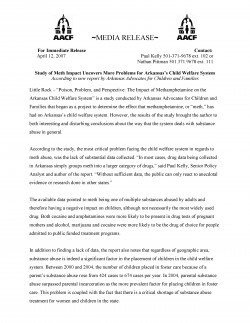
Poison, Problem, and Perspective: The Impact of Methamphetamine on the Arkansas Child Welfare System” is a study conducted by Arkansas Advocates for Children and Families that began as a project to determine the effect that methamphetamine, or “meth,” has had on Arkansas’s child welfare system. However, the results of the study brought the author to both interesting and disturbing conclusions about the way that the system deals with substance abuse in general.
According to the study, the most critical problem facing the child welfare system in regards to meth abuse, was the lack of substantial data collected. “In most cases, drug data being collected in Arkansas simply groups meth into a larger category of drugs,” said Paul Kelly, Senior Policy Analyst and author of the report. “Without sufficient data, the public can only react to anecdotal evidence or research done in other states.”
The available data pointed to meth being one of multiple substances abused by adults and therefore having a negative impact on children, although not necessarily the most widely used drug. Both cocaine and amphetamines were more likely to be present in drug tests of pregnant mothers and alcohol, marijuana and cocaine were more likely to be the drug of choice for people admitted to public funded treatment programs.
In addition to finding a lack of data, the report also notes that regardless of geographic area, substance abuse is indeed a significant factor in the placement of children in the child welfare system. Between 2000 and 2004, the number of children placed in foster care because of a parent’s substance abuse rose from 424 cases to 674 cases per year. In 2004, parental substance abuse surpassed parental incarceration as the more prevalent factor for placing children in foster care. This problem is coupled with the fact that there is a critical shortage of substance abuse treatment for women and children in the state.
“In regard to the impact meth had had on Arkansas’s child welfare system, we’ve concluded that there’s a serious lack of data,” said Kelly. “However, substance abuse in general is clearly having a major impact on the system. We need to immediately improve treatment services to these families.”
As a result of this study, AACF plans to begin working with the Division of Children and Family Servies and ADAPT??? to determine the best way to improve data collection in order to better identify the impact that substance abuse is having, as well as to develop politices that increase access to drug treatment for women and children.
Arkansas Advocates for Children and Families is a statewide, non-profit child advocacy organization established in 1977. Our mission is to ensure that all children and their families have the resources and opportunities to lead healthy and productive lives and to realize their full potential.
